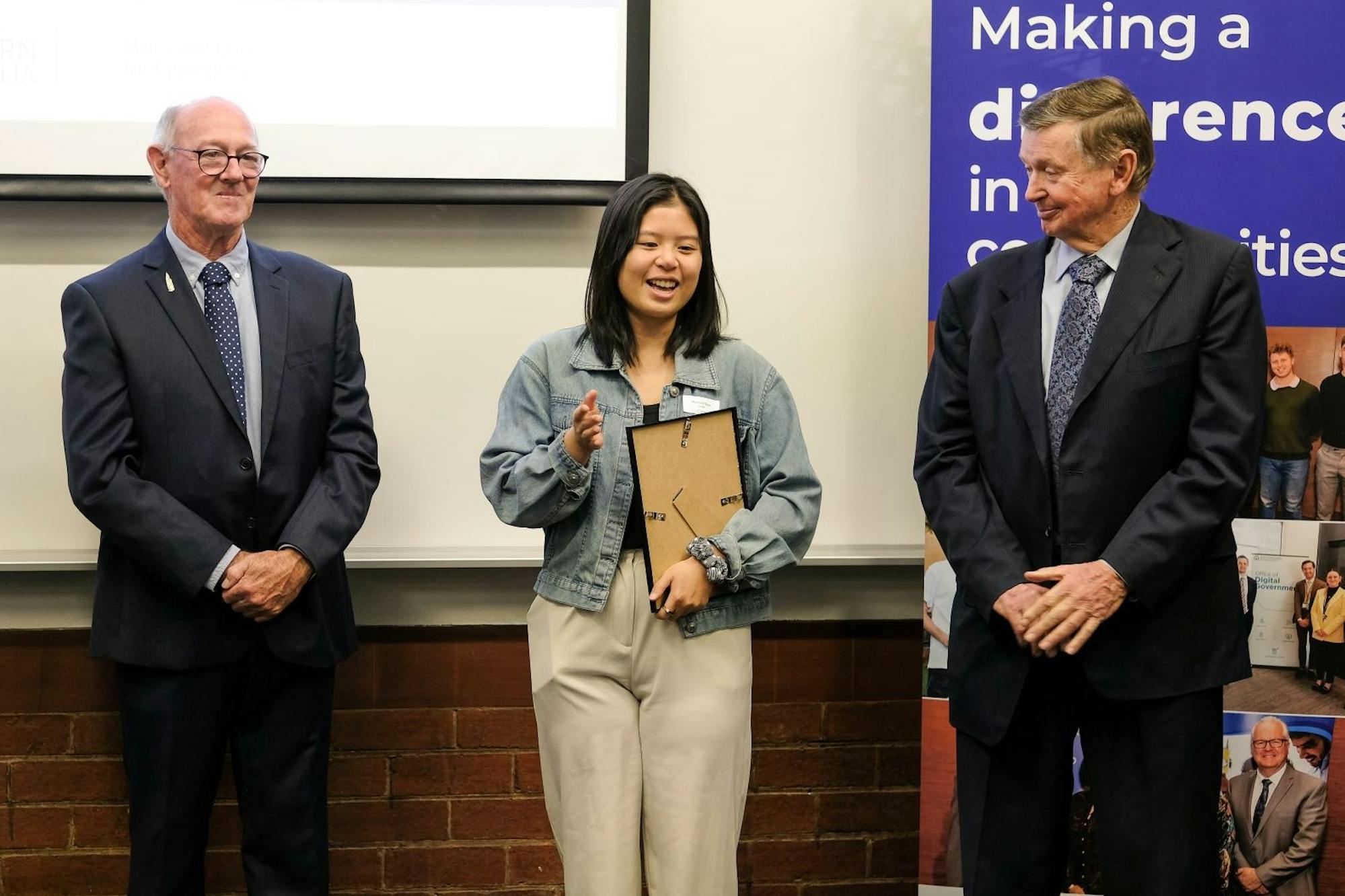Image: Krystal Soo at a ceremony recognising the recipients of the Outstanding Intern Award and students who completed the Minor in Active Citizenship, with His Honour Judge Denis Reynolds (left) and McCusker Charitable Foundation Chair, the Honourable Malcolm McCusker AC CVO KC CitWA (right).
Krystal Soo is studying a Bachelor of Science majoring in Psychology at UWA, and is one of the most recent students to complete the Minor in Active Citizenship through the McCusker Centre for Citizenship.
Krystal shared her thoughts on her involvement with the Centre and completion of the Minor as part of her study, and how these experiences have influenced her plans for the future.
Why did you decide to undertake the Minor in Active Citizenship?
KS: Initially, I wanted to add value to my degree, and realised that I had space for a minor. The Minor in Active Citizenship interested me as I was always keen on improving the wellbeing of my community. I envisioned myself working in a not-for-profit and helping others navigate difficult times; however, I didn’t realise the extent of how smaller, intentional acts of kindness and initiative can result in larger changes.
What did you learn through completing the Minor?
KS: Definitely that every industry and individual, no matter how big or small, can generate positive social impact by basing every action in empathy.
What opportunities do you think completing the Minor has provided you with, or might provide you with in the future?
KS: It generated lots of opportunities for me to use my skills to give back to my community; for example, I used marketing skills for City of Busselton, have joined social movements and protests, and helped create trauma-informed educational resources for lawyers. It has also given me further insight into the processes of generating change and purpose-driven outcomes. It has given me a lot of opportunities to be deeply introspective about my values and goals in the future, not just personal, but also professional.
What do you think completing the Minor added to your university experience?
KS: Completing the Minor in Active Citizenship helped me meet other people who were likeminded in wanting to make a difference.
What are you doing now, and what are your next steps for study and work?
KS: Currently I am a Youth Worker at Mission Australia and Peer Supporter at The Living Room UWA. Both involve intensive support for people with challenging backgrounds and advocating for them to receive additional support.
I am hoping to pick up skills relevant to becoming a crisis intervention support counsellor, and I have been offered a position at a not-for-profit doing advocacy and service navigation work after graduation.
Undertaking the Minor influenced my decision to pursue education and career in Social Work in the future, hopefully specialising as a Mental Health Social Worker.
Do you think it’s important for students to engage in critical thinking about active citizenship?
KS: Students are in that phase of life where they are experiencing a lot of change. Some are moving, transitioning into adulthood, or are beginning to step into their careers. It is important that young people and students have the confidence, reassurance, and realisation they can and will be changemakers in the next generation of workplace and organisational culture.
Students have the ability to create a wave of positive changes which effects will cascade and be felt through their communities and eventually the world. Critically reflecting, engaging, and thinking about active citizenship will enable us to grow as individuals and collectively. Including the Minor in Active Citizenship in my study has helped me become more confident and inspired to be a changemaker through thoughtful design and decision-making processes.
The McCusker Centre for Citizenship’s Minor in Active Citizenship is an interdisciplinary specialisation that develops students' capacities to be caring, connected and socially engaged contributors to their communities. It involves practical engagement with industry partners and critical reflection on personal, community and government responsibility for positive change. You can find out more here.

